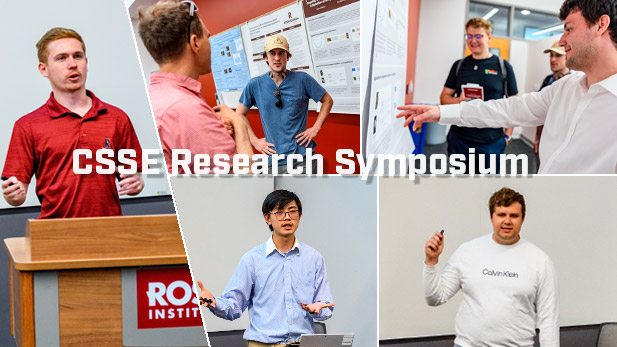Computer Science & Software Engineering Students Present Capstone Research Projects at Second-Annual Symposium

Seniors presented their capstone research projects during the second-annual Computer Science & Software Engineering Research Symposium
Students explored research opportunities in computer science and presented their own research projects May 14 during the second-annual Computer Science & Software Engineering (CSSE) Research Symposium. Eleven students presented their findings in public discussions, with opportunities for networking and mentoring interspersed throughout the day.
"Our goal for the CSSE Research Symposium is to create a memorable, fun experience for the seniors who are doing a research capstone so that it sticks with them and they can treasure that moving forward," said Assistant Professor of Computer Science & Software Engineering Jason Yoder, PhD.
He added, "It also serves as an opportunity for them to be role models for some of the younger students that are considering research to see what's possible. We're trying to build a more integrated community that has these feedback loops to improve the research experience across the whole institute."
The day began with a keynote presentation from Luddy Professor of Computer Science at Indiana University Bloomington and Director of the Luddy Artificial Intelligence Center David Crandall, entitled, "Egocentric Computer Vision, for Fun and for Science."
The CSSE Research Symposium agenda also included a talk with alumna Jessica Myers, who graduated in 2021 with a degree in computer science and minors in data science, math, and music. She is currently pursuing a PhD in computer science at the University of Illinois at Urbana-Champaign, funded by a NASA NSTGRO research fellowship. Myers' talk, "Analysis and Simulation of Robot-Terrain Interaction Sound for Estimation of Terrain Properties and Detection of Anomalies," examined the possibility of using sound and rover microphones to understand planetary surfaces. Myers also provided students with tips for success in graduate school.
"Everything I learned, I learned from Rose," Myers said. "Rose gave me a solid foundation and all of the design principles that really stuck in my mind."
Her advice for students included consistency, curiosity, and iterative improvement.
"If any one is missing, things start to fall apart," Myers explained to the student researchers.
Student presenters each delivered a 20-minute talk about their research, the culmination of a year-long proposal and practice process. Several of these projects will be submitted for publication or conference presentations, with many students planning to continue their research in graduate programs at the University of Houston, Brown University, and Purdue University. Graduates will also apply their findings in industry positions at Caterpillar, SpaceX, NEOCIV, Kratos Defense and Security Solutions, MIT Lincoln Laboratory, RTX, and Zernike Precision Optics.
"We were really impressed with how you were able to communicate everything you've done," Yoder told the seniors during the event. "Compressing everything you've done in a year is not an easy task."
Meg Goforth-Harmon, a senior computer science major, was honored with the Michael Atkins Outstanding Senior Thesis Award for her work, "Ensuring Secure Software Development Beyond Compliance Guides for Government Systems." Goforth-Harmon, who dramatically slammed a binder of data on the ground during her presentation, also was recognized for the Best Use of Prop, as voted by the audience.
Another computer science major, senior Adam Field, was presented with the Best Talk Award and his own personal clicker for his research, "Shifting Perspectives: Uncertainty Prediction for Vision-Language Models via Image Transformations."
Other projects included:
- Evan O'Brien: "Cost Effective Semantic Image Segmentation"
- Lukas Urbonas: "Expanding Rust's Ownership to the Functional Paradigm of Languages"
- Benjamin Joens: "Toward Self-Expanding Recurrent Neural Networks"
- Anthony Mui: "Program Equivalence with AST Variants for Autograders"
- Jacob Consalvi and Jason N. Heflinger: "Distributed Computing for Physically Accurate Kinetic Particle Simulations"
- Edward Kim: "Empathetic Reasoning as a Defense against Persistent Backdoors in Chain-of-Thought Models"
- Allyn Loyd: "Use of Coevolutionary Algorithms to Improve Satellite Image Compression"
- Dominic Oaldon: "Grounded-Theory Study on Student Workload in CSSE Education"
- Kyle Asbury: "Extended Miracle Sudoku is NP-Hard"